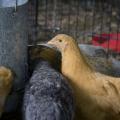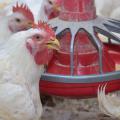4-H Barbecue Program
Suggestions and Procedures for Conducting a County or Area 4-H Barbecue Program
Introduction
Mississippi ranks fifth nationally in number of broilers produced. Many rural families depend on broilers for a major portion of their income. The poultry industry offers many career opportunities for young men and women of Mississippi.
Poultry meat plays an important role in the diets of the American people and in the diets of people worldwide. It is tasty, nutritious and economical. Broilers fit well in outdoor cookery, a popular leisure time family activity.
Many families in Mississippi cook outdoors. Young people need and want to learn how to use outdoor grills to cook meats, especially chicken. A poultry barbecue program will provide an opportunity for any 4-Her to learn more about this important food by demonstrating its preparation. This program provides for the development of the young person and his or her ability to plan, organize, carry out a plan, and even compete with others in the 4-H Poultry Barbecue Contest.
The following topics are discussed in this publication:
- Purpose and Objectives
- Teaching Opportunities for Leaders
- Materials Available
- Eligibility Requirements
- Suggested Procedures for County Programs
- Responsibilities of 4-H Members
This program is designed to provide opportunities for 4-H members regardless of where they live. It is appropriate for farm boys and girls, rural non-farm, urban and suburban 4-Hers.
Purpose and Objectives
The purpose of the Mississippi 4-H Poultry Barbecue Program is to provide an expanded 4-H project that will teach both urban and rural youth the art of barbecuing poultry meat to encourage consumption of broilers, and to acquaint 4-H members with the importance of the Mississippi poultry industry.
This project can aid in the overall objectives of the 4-H program by:
a. Developing skills in selection, preparation, and barbecuing of poultry meat;
b. Acquiring knowledge of the nutritive value of all meats and making intelligent price comparisons based on these values;
c. Exploring career opportunities in the poultry industry as a possible life's vocation;
d. Developing leadership and character by taking part in an organized competition.
Teaching Opportunities for Leader
Conduct barbecue schools for 4-H members to teach the selection of poultry for barbecuing, how to barbecue, and the value of poultry meat. Present demonstrations on lighting and firing charcoal, turning halves, adjusting the grill, determining when the meat is cooked thoroughly, and preparing various sauces.
Organize field trips to local grocery stores and tour a poultry processing plant. This familiarizes 4-H members with modern marketing and merchandising techniques and exposes them to various job opportunities available in the poultry industry.
Organize and train club members in how to serve chicken at county fairs, achievement day programs, and other events.
Materials Available
- Extension Publication 351, Barbecuing Mississippi Broilers
- Barbecue Planning Guide
- 4-H Broiler Barbecue Contest Score Card
Eligibility Requirements
Any 4-H boy or girl may participate regardless of their place of residence. The subject matter to be taught is in the area of consumer education. Therefore, live poultry projects are not a prerequisite for the Poultry Barbecue Program.
Suggested Procedure for County Programs
The first step is to secure a sponsor. If you live in a county where poultry is processed, this would be a possible sponsor. Retail distributors are additional candidates for sponsors.
Set up an awards program. Suggested awards can be:
- Blue ribbon winners -- $15.00
- Red ribbon winners -- $10.00
- White ribbon winners -- $ 5.00
- Ten boys and girls would make a good county program.
Conduct a training meeting to teach each member the proper technique for barbecuing chicken. Extension Publication 351 would be a helpful teaching aid. Requirements to prepare complete barbecue meals for large groups are detailed in the Barbecue Planning Guide.
Select a date to conduct your county Poultry Barbecue Program. Invite the parents of 4-H youth participating in the program. Select a good site for the event (a park, courthouse lawn, or other suitable place). Select at least two judges for the contest or demonstration and inform them of the scoring procedure used on the 4-H Broiler Barbecue Contest Score Card. Invite the sponsor to eat chicken and have them present the awards to all participants.
Responsibilities of 4-H Members
After the training meeting, conduct a minimum of four chicken barbecues. These practice sessions can be attended by family and friends. During the practice sessions, try different sauces to determine the best combinations. After each practice session fill out a practice report and critique the performance of each participant.
Enter the winning 4-H youth in the State 4-H Poultry Barbecue Contest for additional competition and awards.
Prepared by Dr. Tom W. Smith, Emeritus Professor of Poultry Science, Mississippi State University.
Publications
News
Farm supply stores are full of cute chicks in the spring, and the sight of the fluffy baby birds, combined with future dreams of fresh eggs, prompts many people to impulsively start a backyard flock.
STARKVILLE, Miss. -- Keeping buffalo wings on menus is a supply chain issue that goes all the way back to procedures farm workers follow to protect the health of commercially grown chickens.
Baby chickens are so cute and cuddly that few people can resist holding them. Unfortunately, as public interest in raising backyard birds has grown so has the number of Salmonella outbreaks in the U.S. (Photo by Centers for Disease Control and Prevention)







